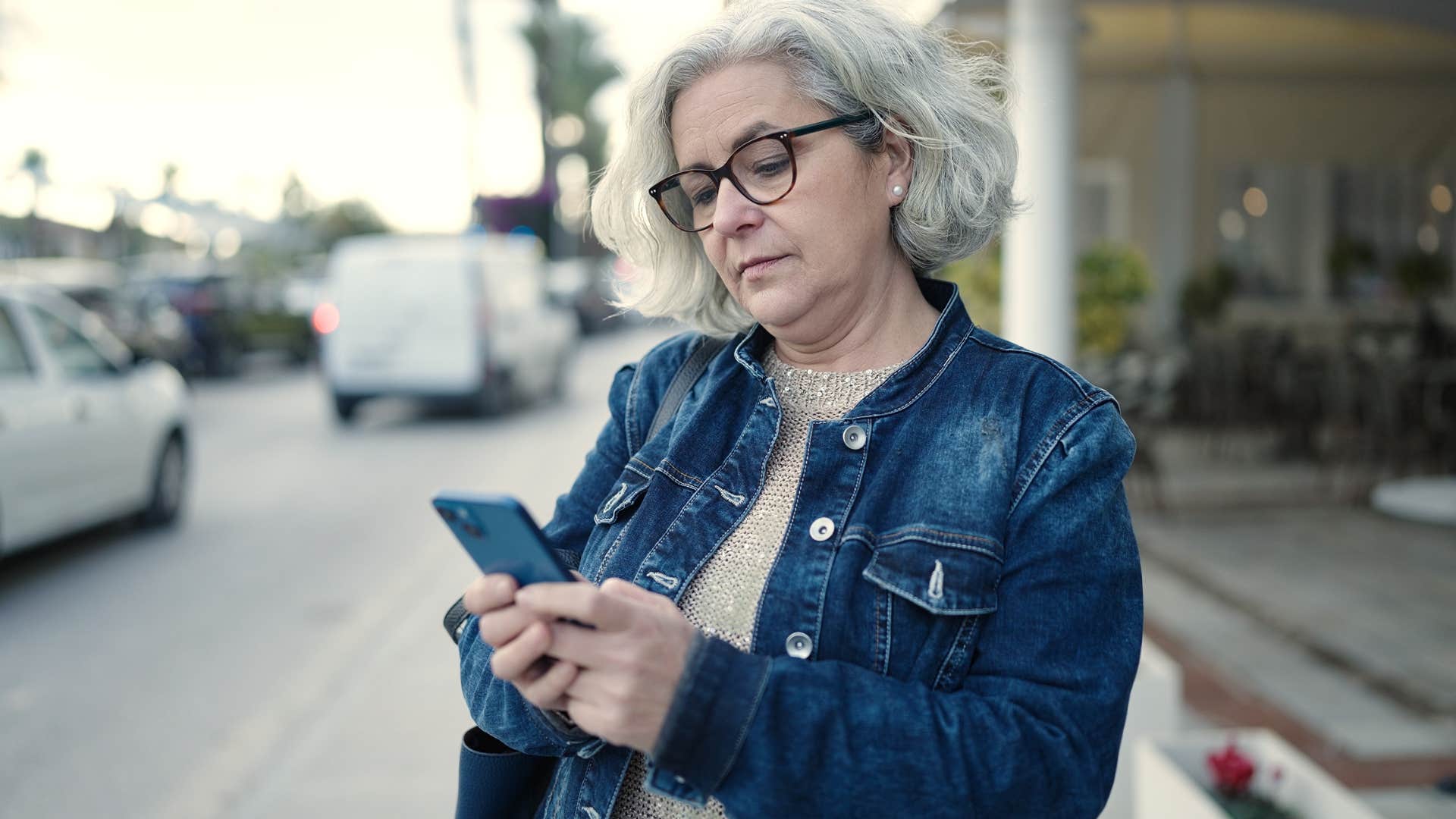Deeply Anxious People Almost Always Send These 11 Texts During Casual Conversations
They over-prepare for and overthink even the most casual interactions.
 evrymmnt | Shutterstock
evrymmnt | Shutterstock For people with social anxiety about having conversations and engaging in interactions in-person, online alternatives, texting, and engaging with the barrier of a screen are often far more comforting, at least according to a study from the Journal of Affective Disorders. However, texting and online conversations have their own unique anxiety-inducing effects, especially without body language, tone, or facial expressions that keep anxious people from overthinking words and phrases.
Online and while reading texts, anxious people may get hung up on a conversation, over-preparing their own messages, and overthinking people’s responses. They spend more time worrying about texts and “decoding” people’s meaning than they do actually conversing. From saying things like “Are you mad?” to “Just ignore me,” deeply anxious people almost always send these texts during casual conversations.
Deeply anxious people almost always send these 11 texts during casual conversations
1. ‘Sorry if that was weird’
 Krakenimages.com | Shutterstock
Krakenimages.com | Shutterstock
Text anxiety, like overthinking about not getting a response or reading heavily into people’s messages, can often affect already-anxious people intensely in their daily lives. Deeply anxious people may even send messages like “sorry if that was weird” during casual conversations to cope, assuming the worst when someone sends a one-word response or doesn’t answer at all.
To confirm their inner insecurities and anxiety, they put those negative thoughts out into the universe. Even if it’s misguided, confirmation of these fears is strangely reassuring for an anxious person. They’re not overthinking, but instead receiving confirmation or reassurance that their anxieties are rooted in reality.
2. ‘No worries if not’
 MAYA LAB | Shutterstock
MAYA LAB | Shutterstock
Before someone even has a chance to respond to their text or turn down their request to hang out, a deeply anxious person may automatically provide a “cop out” in a text message to protect their own insecurities. Whether it’s “I know you’re busy” or “no worries if not,” they’re always one step ahead in predicting someone’s disinterest in their own needs, desires, and texts.
Even if it seems like a way to fleetingly cope with insecurity and discomfort, projecting these insecurities and anxieties onto other people over text only encourages them to feel like an emotional dumping ground.
3. ‘Are you mad?’
 Dikushin Dmitry | Shutterstock
Dikushin Dmitry | Shutterstock
Many socially anxious people prefer online communication because it gives them a level of control in fending off traditional fears of in-person interactions and also managing how they’re viewed and perceived by others. However, when things over text don’t go as expected — someone sends a vague response or doesn’t answer at all — it can spark anxiety over a lack of control or understanding that prompts questions like “Are you mad?”
Deeply anxious people almost always send these texts during casual conversations, even though they actually end up straining relationships and encouraging people to feel burdened with the pressure to reassure.
4. ‘Did I say something wrong?’
 Krakenimages.com | Shutterstock
Krakenimages.com | Shutterstock
Deeply anxious people often over-prepare and overthink even the most basic conversations, both on their phones and in-person. They assume immediately that silence is another person’s anger or discontent, instead of someone being busy or distracted, so phrases like “Did I say something wrong?” are incredibly common.
They assume the worst in every conversation, or at least, the outcome that aligns with and reassures their anxieties in reality. Even though research proves that many of us are liked more by people after conversations more than we imagine, deeply anxious people lean into their own insecurities in ways that sabotage genuine and authentic conversations.
5. ‘Just ignore me’
 DimaBerlin | Shutterstock
DimaBerlin | Shutterstock
Social isolation often prompts a ton of adverse mental health outcomes, from heightened anxiety to depression, but, unfortunately, it’s also one of the ways that anxious people cope. Rather than asking for help or leaning into the discomfort of addressing their struggles, they isolate themselves — both on a micro-level, like sending a text message like this one, or in larger, life-altering ways.
Even if it’s a personally motivated coping mechanism, these kinds of texts often further isolate anxious people. Whoever is on the other end receiving the text is bound to be frustrated, feeling like an emotional dumping ground for another person’s anxieties and insecurities.
6. ‘You don’t have to reply, but...’
 Krakenimages.com | Shutterstock
Krakenimages.com | Shutterstock
Texting and interacting with others online is often more influential for our relationships than we give it credit for, at least according to a study from Computers in Human Behavior, which found links between texting and general relationship satisfaction.
So, if an anxious person is constantly following up their texts with a phrase like “you don’t have to reply,” chances are it’s going to spark some disconnection or tension in the relationship with whoever they’re speaking to. It’s a clear projection of their own insecurities, even if it seems subtle and nondescript.
7. ‘No pressure at all’
 voronaman | Shutterstock
voronaman | Shutterstock
If an anxious person is sharing a need or texting about a sensitive topic with someone on their phone, that increases their risk for being misunderstood or misinterpreted. Without the context of facial expressions or body language, these topics can be much harder to resolve and discuss over the phone.
In alignment with text messages like “no pressure at all” in casual conversations, an anxious person could be subtly undermining their own needs and comfort for the sake of being “likable” or “agreeable” to other people.
Of course, it’s hard to stand up for yourself in person, but it’s equally necessary that you also do it over the phone, even if there’s comfort in letting people minimize your emotions and needs.
8. ‘I didn’t mean it like that’
 Prostock-studio | Shutterstock
Prostock-studio | Shutterstock
It’s not uncommon for texts that lack emotion, context, and tone to be regularly misunderstood by the person who’s receiving them. That’s why difficult conversations, emotional discussions, and sensitive topics often find a better, safer place for true communication in person, rather than behind a screen.
However, when a deeply anxious person, who prefers the buffer of their phone in complex, uncomfortable situations, talks about these topics over text, they may also need to send a text like “I didn’t mean it like that often.”
Rather than picking up the phone and calling or getting together to clear up confusion, they continue to shift their texts and send insecure messages to protect themselves from harm.
9. ‘It’s okay if you forgot, just checking in’
 Mariana_erato | Shutterstock
Mariana_erato | Shutterstock
People who send text messages like this are often prone to overstepping their own boundaries and people-pleasing to keep the peace, even if it means minimizing their own feelings and emotions. They’re constantly shifting their conversations and text messages to protect themselves from their own insecurities, trying to appease other people before themselves.
Even when they’re not aware of it, a chronic people-pleaser is always putting other people ahead of themselves. Whether it’s in person with a friend, in a work meeting, or texting with loved ones, they’re prone to putting their own needs and feelings on the back burner.
10. ‘Do you hate me now?’
 Krakenimages.com | Shutterstock
Krakenimages.com | Shutterstock
Many anxious people crave instant reassurance and comfort from other people, even if they don’t consciously notice it. They’re always sending text messages like “Do you hate me now?” or seeking approval before making a decision, because their well-being often rests in how other people feel about and perceive them.
They are always thinking about the worst-case scenario — often, being rejected by others, both online and in-person — which leads them to send texts that try to “get ahead” of their inevitable pain. They want to seek out answers to questions like “Am I a burden?” that they already believe internally on some misguided, subconscious level.
11. ‘Is this a bad time?’
 Prostock-studio | Shutterstock
Prostock-studio | Shutterstock
Like many other text messages above, a question like “Is this a bad time?” can be a sign of a person’s fear of rejection or of being a burden to others. They apologize for reaching out or assume that people don’t want to talk to them before even getting a response, which leads to disconnects that burden people with reassurance.
Deeply anxious people may be great friends or partners, but their need for reassurance and validation when they’re feeling low can quickly sabotage these relationships and connections.
Zayda Slabbekoorn is a senior editorial strategist with a bachelor’s degree in social relations & policy and gender studies who focuses on psychology, relationships, self-help, and human interest stories.

